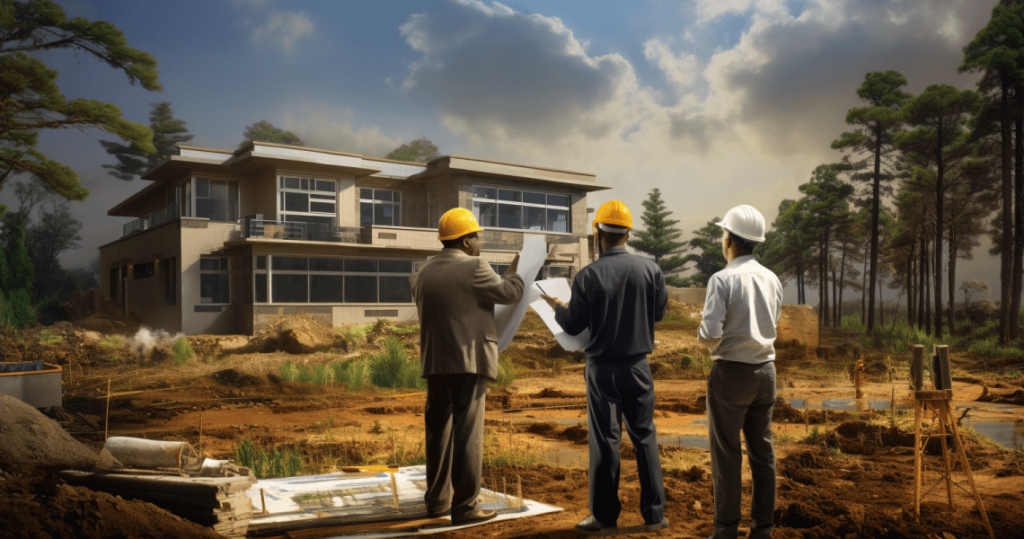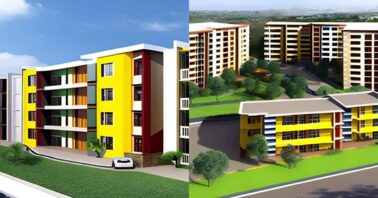- Building permits in Kenya are crucial for all construction projects, regardless of their size or nature. They ensure compliance with regulations and contribute to safety and environmental standards.
- Building approvals in Kenya vary based on factors like project type, size, estimated expenses, and location. Counties operate their own system for reviewing and granting permits, adding complexity to the process.
- Attempting to build without a permit can result in higher costs, potential removal of work for inspections, and even demolition of the structure.
In Kenya, embarking on any building development project inevitably entails obtaining building approvals. There are no exceptions, not even for projects involving semi-permanent housing or boundary walls.
Building permits are essential for every construction project in Kenya. They are more than just paperwork; they ensure your project is safe, eco-friendly, and follows the rules.
It’s important to understand, however, that construction approvals in Kenya are far from uniform. The procedures, regulations, and associated costs vary significantly depending on factors such as the type of structure, its size, estimated expenses, and its geographical location.
READ ALSO: All You Need to Know About Building a Home in Kenya
One noteworthy aspect is that each county within Kenya operates its own distinct system for reviewing, assessing fees, and granting construction approvals.
Table of Contents
What is a building permit?
A building permit is an official document that signifies approval from the relevant authority, confirming that a proposed building adheres to established design, construction standards, and regulations.

In Kenya, building permits typically hold a validity period of two years.
Which Building Permits Are Necessary in Kenya?
There are four mandatory construction approvals in Kenya:
- Architectural plan approval
- Structural plan approval
- EIA license/NEMA approval
- NCA project registration
It’s worth noting that this list is not exhaustive but represents the standard prerequisites for most building developments across Kenyan counties before construction begins.
Step-by-step process of obtaining building permits in Kenya
- Obtain a Survey Plan from a Surveyor: To kickstart the process, your initial task is to consult a registered surveyor in your vicinity to obtain a survey plan, a necessary component of your building permit application. A survey plan serves as an official document that precisely delineates the boundaries of your land, providing accurate measurements and descriptions. Before you receive the survey plan, you must furnish the surveyor with a title deed as evidence of your ownership of the land earmarked for development.
READ ALSO: Essential Tips to Find a Good Property Surveyor in Kenya - Obtain a project report from an environmental expert: After securing the survey plan, the next step involves enlisting the services of a certified environmental expert. Their role is to compile a project report, which must then be submitted to the National Environmental Management Authority (NEMA).
- Obtain approval from NEMA: Since the implementation of the Environmental Management and Coordination Act on February 27, 2009, it has become mandatory for businesses to secure project approval from the National Environment Management Authority (NEMA). This requirement applies to projects across all risk categories and necessitates conducting an Environmental Impact Assessment (EIA).
- Architectural Plans Submission: The engineer or contractor overseeing the project initiates the process by submitting architectural drawings to the local government for approval.
- Structural Plans Approval by County Council: Following the approval of the architectural plans, the engineer or contractor submits detailed structural plans outlining how the building or structure will be constructed.
- Official Stamps for Plans: Once the plans receive approval, the architect submits hard copies to the local county government for official stamping.
- Project Registration: The contractor must register the construction project with the Construction Authority. This involves filling out a project registration form that provides project details. A compliance certificate is issued upon completion.
- Site Inspections by the Construction Authority: The Construction Authority conducts site visits to verify compliance with the approved plans and environmental clearance. An invoice is generated after the inspection.
READ ALSO: Construction Laws Kenya: 6 Things You Should Know - Payment Submission: After the inspection by the Construction Authority, the applicant submits the payment. Upon payment, the applicant receives a provisional certificate of compliance, which is valid for 90 days. If there are no compliance violations during this period, a final compliance certificate will be issued. The approval process typically takes around seven days.
This comprehensive process ensures that construction projects in Kenya adhere to legal and safety standards.
Cost of a Building Permit in Kenya
Here are the fees associated with various aspects of the construction approval process in Kenya:
- Folio Registry Number Search: Ksh 150
- Survey Plan: Ksh 650
- NEMA Approval Fees: Ksh 10,000.00
For the building permit fee, it is calculated based on the size of the building with an estimated cost of Ksh 21,000 per square meter. The fees are broken down as follows:
- Building Plan Approval Fee: 1% of the estimated cost of construction
- Construction Sign Board Fee: Ksh 25,000
- Application Fee: Ksh 5,000
- Inspection of Building File: Ksh 5,000
- Occupation Certificate: Ksh 5,000
Additionally, there is an NCA levy, which amounts to 0.5% of the total cost of the construction project.
Can you build without a building permit in Kenya?
The temptation to bypass the permit process and undertake hidden work, especially inside your home, can be strong. However, if local authorities discover the absence of a permit, you may face costly consequences.
This includes the need to apply for a permit at a higher cost, the potential removal of walls or ceilings for inspections, and even the possibility of demolishing the entire structure if construction errors are discovered.
READ ALSO: When the Center Can’t Hold: Unsafe Buildings Crisis in Kenya
Additionally, there may be fines for skipping the permit process, and questions may arise about whether you can obtain a permit after the work is completed.
Unfortunately, you typically must adhere to the entire permitting procedure beforehand; otherwise, your structure may be at risk of demolition. The fines for building without a permit depend on local government regulations, which can change and compel you to dismantle such a structure.



